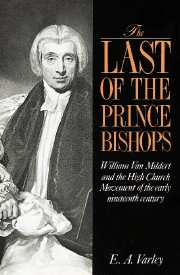 The Last of the Prince Bishops
The Last of the Prince Bishops Summary
R. W. Church, Dean of St Paul's, spent the last months of his life working on The Oxford Movement, his retrospective on the eventful period 1833–45. He died without completing it, but friends saw it into print in 1891. Church told Lord Acton he aimed
to preserve a contemporary memorial of what seems to me to have been a true and noble effort that passed before my eyes, a short scene of religious earnestness and aspiration, with all that was in it of self-devotion, affectionateness, and high and refined and varied character, displayed under circumstances which are scarcely intelligible to men of the present time; so enormous have been the changes in what was assumed and acted upon, and thought practicable and reasonable, ‘fifty years since’. For their time and opportunities, the men of the movement, with all their imperfect equipment and their mistakes, still seem to me the salt of their generation …
Dean Church was speaking of the Tractarians; his words apply with almost the same force to their immediate spiritual forebears, the early nineteenth-century High Church renewal movement remembered as the ‘Hackney Phalanx’.
Church would deny the application. For him, 1833 found the ‘official’ Church leadership ‘stunned and bewildered by the fierce outbreak of popular hostility’, unready for the crisis.
- Type
- Chapter
- Information
- The Last of the Prince BishopsWilliam Van Mildert and the High Church Movement of the Early Nineteenth Century, pp. 1 - 6Publisher: Cambridge University PressPrint publication year: 1992
